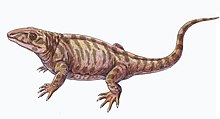蜥代龙科
蜥代龙科(Varanopidae)是合弓纲盘龙目的一科,外表类似现代巨蜥,被推测可能有类似巨蜥的生活习性。蜥代龙类没有发展出类似异齿龙的高大背帆。大多数蜥代龙类的体型小,如老鼠至狗的大小,少数蜥代龙类的体长可达1到2米[1]。
| 蜥代龙科 | |
|---|---|

| |
| 蜥代龙 | |
无效状况
| |
| 科学分类 | |
| 界: | 动物界 Animalia |
| 门: | 脊索动物门 Chordata |
| 纲: | 合弓纲 Synapsida |
| 非正式类群: | 盘龙目 Pelycosauria |
| 亚目: | 真盘龙亚目 Eupelycosauria |
| 科: | †蜥代龙科 Varanopidae Romer and Price, 1940 |
特征
编辑蜥代龙类已经发展出真盘龙亚目的先进特征,例如延长、深、狭窄的头骨。牠们的颌部很长,而牙齿锐利。但仍然较为原始,就像盘龙目的其他科,蜥代龙科是从晚石炭纪的小型原始合弓动物进化而来。牠们具有长尾巴、类似蜥蜴的身体、修长的细腿、鳞片和发达的松果眼[2]。蜥代龙类为肉食性或食虫性。与二叠纪早期的其他动物相比,蜥代龙类的身体结构适合快速奔行和攀爬。但蜥代龙类最后逃不过竞争,牠们被双孔动物取代。到了二叠纪中期,蜥代龙类几乎绝种。在南非锯颌兽集合带(Pristerognathus Assemblage Zone)发现的一个蜥代龙科化石,年代为中二叠纪最末期,是目前已知最晚期的蜥代龙科化石纪录[3]。
分类与种系发展史
编辑在1986年,Basicranodon、Ruthiromia曾一度被归类于蜥代龙科,但之后研究多不沿用这个分类。在2012年的早期合弓纲研究,再度研究这两个属。Ruthiromia被发现是铜蜥龙(Aerosaurus)的近亲。Basicranodon的化石材料有限,只有部分头盖骨,发现于奥克拉荷马州的空谷阶地层。Basicranodon有两个可能的演化位置,鼻蜥龙亚科、或是Pyozia的姊妹分类单元。Basicranodon曾被认为是鼻蜥龙的次异名;在这份新研究中,则提出两者的牙齿分布、基翼突形状等差异,这代表牠们可能是不同物种[4]。
合弓纲 Synapsida
- 盘龙目 Pelycosauria
Apsisaurus最初被归类于双孔亚纲始鳄目。在2010年,罗伯特·雷斯兹(Robert R. Reisz)等人将Apsisaurus列为蜥代龙科的原始种类。以下演化树来自于罗伯特·雷斯兹等人的2010年研究[6]:
| 蜥代龙科 |
| |||||||||||||||||||||
参考资料
编辑- ^ Reisz, R.R. & Laurin, M. A reevaluation of the enigmatic Permian synapsid Watongia and of its stratigraphic significance. Canadian Journal of Earth Sciences. 2004, 41: 377–396.
- ^ Botha-Brink, Jennifer; Modesto, Sean P. A mixed-age classed ‘pelycosaur’ aggregation from South Africa: earliest evidence of parental care in amniotes?. Proceedings of the Royal Society B: Biological Sciences. 2007-11-22, 274 (1627): 2829–2834 [2020-02-23]. ISSN 0962-8452. PMC 2288685 . PMID 17848370. doi:10.1098/rspb.2007.0803. (原始内容存档于2020-06-06) (英语).
- ^ Modesto, S.P.; Smith, R.M.H.; Campione, N.E.; Reisz, R.R. The last “pelycosaur”: a varanopid synapsid from the Pristerognathus Assemblage Zone, Middle Permian of South Africa. Naturwissenschaften. 2011, 98: 1027–1034. doi:10.1007/s00114-011-0856-2.
- ^ 4.0 4.1 Benson, R.J. Interrelationships of basal synapsids: cranial and postcranial morphological partitions suggest different topologies. Journal of Systematic Paleontology. 2012,. in press [2012-12-19]. doi:10.1080/14772019.2011.631042. (原始内容存档于2016-04-12).
- ^ Frederik Spindler; Ralf Werneburg; Joerg W. Schneider; Ludwig Luthardt; Volker Annacker; Ronny Rößler (2018). "First arboreal 'pelycosaurs' (Synapsida: Varanopidae) from the early Permian Chemnitz Fossil Lagerstätte, SE Germany, with a review of varanopid phylogeny". PalZ. 92 (2): 315–364. doi:10.1007/s12542-018-0405-9.
- ^ Robert R. Reisz, Michel Laurin and David Marjanovic. Apsisaurus witteri from the Lower Permian of Texas: yet another small varanopid synapsid, not a diapsid. Journal of Vertebrate Paleontology. 2010, 30 (5): 1628–1631. doi:10.1080/02724634.2010.501441.
外部链接
编辑- Varanopseidae - at Paleos